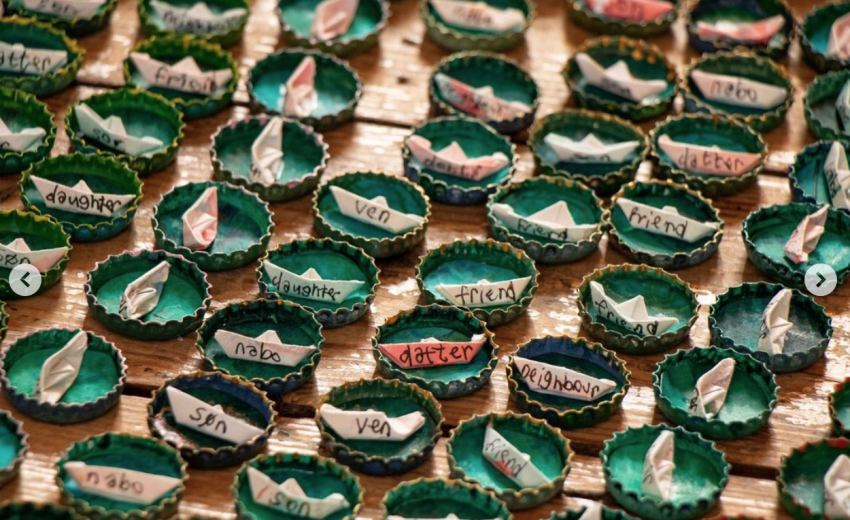“It is in the small and the simple that the human scale may be found and where one mind is changed, we begin to change the world.”
Jill Seggar, author
Bern O’Donoghue is a UK born artist making politically and socially engaged work. She explores the power of language to change perception. Based in Brighton for 25 years, much of her experimental and participatory practice can be described as Artivism, with a focus on community and social engagement, inviting members of the public to become involved in projects that test how we can enhance our world, one small creative act at a time. The issues addressed are often complex and emotive, with the potential for participants to feel challenged and uncomfortable. And, though timely, who really wants to discuss vulnerability, identity, displacement, migration, our collective and individual rights, or the responsibilities we have towards each other, with strangers? O’Donoghue’s focus is to provide the safe spaces in which such conversations may be had with nuance, and where differences may be tolerated, or even embraced.
Far From Home presents elements from three of the artist’s current projects, with each one looking at a different aspect of displacement. The first invites host communities to connect personally on a human level with the devastation caused by hostile borders. The second examines how the language we hear from people in power is used to harness our feelings and the third looks at what kind of response our communities and we alone might make if we were to encounter refugees without the rhetoric, simply as people. Together the projects explore social, political and personal aspects of being on the move, what it means to belong and why it’s important who gets to decide.
DeadReckoning invites the audience to recognise the people hidden behind migration statistics. It is a lengthy undertaking: a 10-year project, producing one installation per year based on that specific year’s statistics and reaching completion in 2025. The data used is open source and collected by the Missing Migrants Project on behalf of the International Organisation on Migration, which records the deaths of people attempting to reach Europe via the Mediterranean Sea migratory routes. In private vigil, she turns this data into something emotive and familiar, intentionally manufacturing each installation from materials found in her home, honouring people who have fled theirs, using the commonplace to weave a connection between the audience and the deceased, so that people living in host communities feel the urge to hold and engage with the subject matter. This can be laborious work: if, for example, 2,500 people were to be recorded as having died in one specific year, 2,500 individual objects would have to be made to bear witness to each loss of life. Every one of these objects, because they represent the death of a significant individual, will have the words “son”, “daughter”, “neighbour “ or “friend” written, sewn or painted upon them, acknowledging their worth to someone else. Once all the objects are completed, O’Donoghue brings them into civic spaces and begins the co-production of building an installation, forming a brief but emotional connection between herself and a curious group of strangers, facilitated through questions being asked and stories exchanged, dispelling myths and bringing the media and political policy narratives into shared ground through collective action.
As they work together, people begin to understand that they are taking part in a ritual to bear witness and ultimately make space for the possibility of reframing our narratives around refugees, asylum seekers and migrants. As Santiago Zabala argues, “Instead of inviting us to contemplate its beauty, a work calls us to respond, react and become involved”.
Much of O’Donoghue’s work is rooted in language and its power. With the DogWhistlePolitics series, she offers a chance to slow down and consider how the Hostile Environment takes root. We have created increasingly perilous physical borders that desperate people feel forced to breach, but the first border for migrants and refugees is built in the minds of the people already living in communities that could host them. This is not lost on politicians, social commentators and pundits. DogWhistlePolitics asks where does our information come from? Who is it that sets the tone and to what end? This series of works argues that politicians and in particular the Government, should lead by example, showing greater commitment to setting an honest and fair tone around migration and displacement.
And lastly, how do we as members of the host community want to respond to people needing our help? Are we observers or can we move into action? Are we even aware of our power or impact? What is it that people seeking sanctuary need from us and what could/should we offer? OurCommonThreads considers these questions, and our own responsibility as members of a community, sewing the thoughts and wishes of past and present refugees and asylum seekers on their own clothing, which are donated to the project in return for a contribution from the artist to a charity of the (former) refugee’s choice. O’Donoghue approaches potential participants in this project to take part only if she believes their values resonate with the ideas behind OurCommonThreads and the other projects that she has chosen to exhibit at ONCA today, namely:
The personal is political.
We shape our actions first with our words.
We can make the world better through small, creative acts.
Can exploring our common vulnerability help us to have increased solidarity with people on the move?
Santiago Zabala: ‘Why Only Art Can Save Us: Aesthetics and the Absence of Emergency’ Columbia University Press (3 Oct. 2017)
—
Share on Twitter /
Share on Facebook
Posted on May 17, 2024
Categories: Uncategorized
→ Announcing ONCA’s Ending
← The Living Coast Artist Residency 2024
